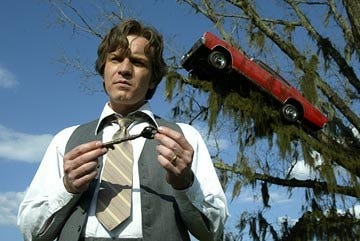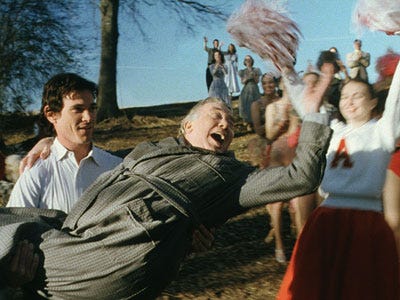The Burton Binge: "Big Fish"
Each Sunday with “The Burton Binge,” Sam Watermeier will look back at one of Tim Burton’s films, ultimately tracing the return to the auteur’s roots with the October 5 release of “Frankenweenie,” an animated adaptation of Burton’s first live-action short film.

Tim Burton does his best work on small canvases. Although he is known for grand, sweeping spectacles like “Batman,” “Batman Returns” and “Charlie and the Chocolate Factory,” the most magical moments in his films are understated and intimate.
“Big Fish” is about men who can’t distinguish the grand from the intimate and vice versa.
His most personal and poignant film since “Edward Scissorhands,” “Big Fish” redeemed Burton from the movie that almost ruined him, “Planet of the Apes.”
Based on the book by Daniel Wallace, “Big Fish” follows a man who recalls his life as a myth — not just for the sake of entertaining his son, but because he truly considers it a tall tale. Throughout the film, Edward Bloom (played by Ewan McGregor and Albert Finney) encounters witches, wrestles sea creatures, joins the circus, etc. He's a mythical hero with the heart of an everyman.
The film is jarring in its juxtaposition with reality because it’s not Burton’s typically skewed vision of it. It’s the bland, quiet reality we all know too well. You can practically smell the hand sanitizer in Bloom’s hospital room near the end of the film.
As the dying Bloom retells his life story, the weight of his circumstances become almost too heavy to bear — especially as his son (Billy Crudup) grows tired of the man’s fantasy world.
It’s here that Burton does the best, most universally powerful work of his career. While most of his films speak to outsiders and alienation, “Big Fish” speaks for something to which everyone can relate — the larger-than-life nature of parents. Through Bloom’s son, Will, it also speaks to children’s resentment that they will never relate to their parents on the same level. And it’s a complex kind of resentment — a simultaneous yearning for, and anger regarding, a parent’s vulnerability.
Burton’s father died a month before he signed on to direct “Big Fish.” You can feel his pain and catharsis coursing through every frame.
The last scene in which Will confronts his feelings about his father may be the most powerful moment in Burton’s filmography — a fusion of magic and reality as seamless and stirring as anything seen on screen in years.

But the film isn’t perfect. For one thing, Crudup’s performance is a bit stilted, at least in the beginning. However, the concluding scene features the most tender, natural acting of his career. The film itself also never reaches a strong emotional release until the end. But it’s well worth waiting for. In hindsight, all of Burton's films seemed to be building up to this one.
Films like this make Burton easy to forgive. But that feeling may be difficult to maintain when I revisit “Charlie and the Chocolate Factory.” We’ll see. Stay tuned!
P.S. If you want to see that concluding scene I was ranting and raving about, here it is.


